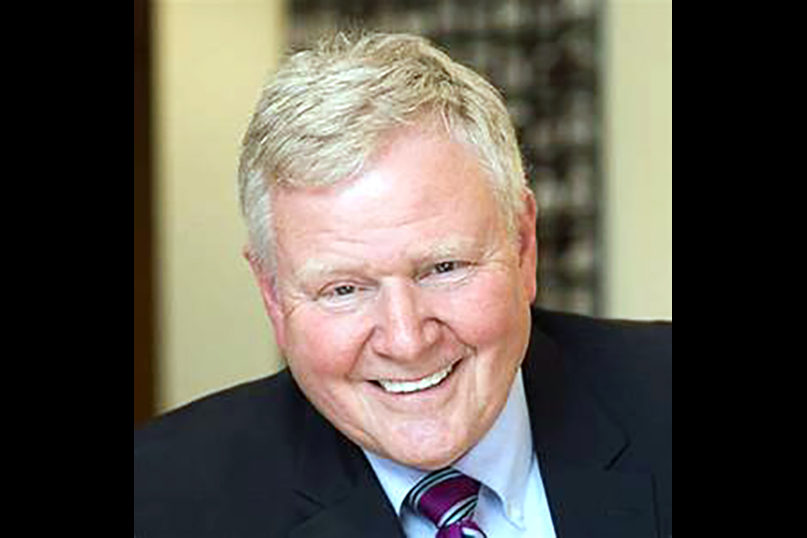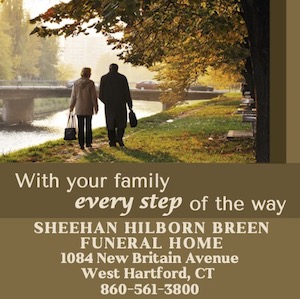
A powerful voice on the American Jewish communal scene talks about Jewish identity and the Jewish people.
By Stacey Dresner
HARTFORD – Barry Shrage served for 30 years as president of Combined Jewish Philanthropies of Greater Boston (CJP) and as a powerful voice on the American Jewish communal scene.
Following Shrage’s retirement from CJP in 2018, he joined Brandeis University’s Hornstein Jewish Professional Leadership Program as Professor of the Practice. At Hornstein, Shrage trains and mentors students in their future roles as Jewish professional leaders. He works closely with the Cohen Center for Modern Jewish Studies, where he is developing and leading a new initiative on Jewish identity. The Initiative for Jewish Identity (IJI) will examine Jewish identity historically and in the contemporary context and build on that understanding to identify and support community programs that can produce large-scale measurable impact on Jewish engagement.
Shrage will discuss “What Drives Us Apart and What Holds Us Together? Jewish Identity, Jewish Community and the Jewish People,” as guest speaker of the 8th Annual Saul Cohen-Schoke JFS Lecture on Thursday, Nov. 14, 7:30 p.m. at Ferguson Library in Stamford.
A New York native, Shage graduated from the City College of New York, and earned a master’s degree in social work from Boston University.
He recently spoke to the Jewish Ledger about his upcoming talk.
JEWISH LEDGER: Can you tell us about your Jewish upbringing?
BARRY SHRAGE: I went to a Jewish day school – Modern Orthodox, Zionist Orthodox – from first grade to eighth grade. Yeshiva Rabbi Moses Soleveichik in Washington Heights. So that was sort of the beginning of my Jewish journey. When I went to high school and college I probably moved away somewhat from the Orthodox community and wasn’t that involved with Jewish things at all. In college in the 60s, I was involved, as most people were, in various kinds of anti-war activities, the Civil Rights movement, that kind of thing.
I came back later on when I started graduate school in social work and I had a fieldwork placement in a Jewish Community Center. I started working for Jewish community centers when I got out of graduate school.
At that point I also became involved with Avi Weiss. I was living in Riverdale at the time and Avi Weiss was the rabbi at the Hebrew Institute of Riverdale, but also the founder of all kinds of interesting liberal Orthodox programs involving women more fully in Orthodox life. He was just a very charismatic rabbi and a wonderful friend. So I became involved in the modern Orthodox community that way and that’s where I am kind of right now.
But most of my Jewish involvement was not part of the Orthodox community. At the beginning, it was working for Jewish community centers and then for the last 40 years working at Federation. I was deeply involved in making things better for the Jewish community as a whole.
JL: Speaking of the 1960s, is it true that you were inspired to return to your Jewish roots by the Black Power movement?
BS: Well, the late ‘60s were a time when everyone was becoming more conscious of their own identity. There were lots of things that were involving people at that time – for instance, the Six-Day War and engagement with Israel became critical.
But when it came to being able to be proud of who you were, a lot of things were happening. On the Jewish side there was Meir Kahane [and the Jewish Defense League], which, in the beginning was kind of a Jewish pride thing; then became crazy later on. People were looking for who they were. In those days, you could feel generally proud of who you are, which was a big break from the ‘50s where everybody sort of wanted to be the same: to be identified as just American; to look American and feel American. And the idea that you could be fully American on the one hand and fully who you are on the other I think was a revelation. It was a positive thing in those days.
JL: What made you go into Jewish communal work?
BS: I think it awakened in me some of the ideas and feelings that I had even when I was a kid in the yeshiva, which is that there was something beautiful, something worth preserving, and that a renaissance of Jewish life was possible and could fill people’s lives with joy and meaning and hope, not isolated from everything else going on in the world, but very much part of what was going on in the world.
From the beginning I was concerned about assimilation and the idea of Jewish identity disintegrating. I very much thought that assimilation could be overcome; that it was possible to be fully engaged in the world and also fully Jewish, that there didn’t need to be a conflict between particularity and universality, between caring about the Jewish people or the world in general. There was hope of creating something very special and interesting for the American Jewish community that would help us to overcome the general tendency toward full assimilation and forgetting who we are.
JL: This past year there have been a number of antisemitic acts in the Boston area. Is this indicative of a general trend or is something happening in Boston?
BS: I don’t think there is any particular trend of antisemitism in Boston, any more or any different from any other community. In general the doors have been opened to racism and extremism in this country and around the world. And certainly those are trends that have to be fought against. We have to be able to have some kind of strategy for dealing with it, for assuring that our communities are safe. On the other hand, I don’t believe that we have to live in fear. I think we have to be assertive and positive in living a full Jewish life and take whatever security measures we have to take.
JL: What prompted your move to Brandeis and what is your role there?
BS: Well, in the first place, at 70, and after serving for 31 years, I felt like it was an excellent time [to leave CJP]. The Federation is very strong, the community selected a wonderful leader to follow me, and it was just a good time to think about what the next stage of my life was going to look like. So I was looking around and Brandeis was very open to bringing me on board.
I need to work. I love working for the Jewish community. In addition to my family, it’s been my life, and very rewarding, wonderful and positive. People joke that it must be difficult to work for the Jewish community and 225,000 Jews, but I actually found it fascinating – just a wonderful people and wonderful relationships. And really, in Boston at least, a wonderful opportunity to think new thoughts and develop new programs and a huge openness to new ideas and to new directions.
The Hornstein program for Jewish Leadership has been around for 30 years, maybe more, and it trains the next generation of Jewish communal professionals, which is great, and I’m also developing a thing called the Initiative on Jewish Identity, kind of a think tank at Brandeis.
JL: Can you describe the initiative?
BS: One of the center points of my professional life has been to work on issues of Jewish identity… I think it’s more complicated than its ever been with all kinds of different theories and ideas about how to deal with issues of Jewish identity. We hope our initiative can help sort through some of that.
I’ve always been a huge advocate of Jewish education… It turns out that it’s not just formal Jewish education that matters, but informal experiences can have a huge impact and, of course, Birthright Israel is a great example of that. Before you start getting engaged in Jewish learning you have to learn to care about the Jewish people; care about the community. Until you feel that way, it is unlikely that you are going to want to learn more about Torah and Jewish culture and the wonderful values that Judaism represents.
There is a huge debate going on right now about how exactly the American Jewish community’s relationship with Israel, especially, the next generation’s, fits into our plans for the future. I maintain that right now one of the most important ways that we have of strengthening the identity of young American Jews is really Birthright and in general strengthening our ties to Israel.
On the other hand, people will point out that there are lots of things that stand in the way of a close relationship with Israel. So among the ideas that I’m floating for this is, number one, to strengthen Israelis’ understanding of the American community. Right now there are already hundreds of thousands of Israelis that have American experiences. I think it’s possible to formulate programs in Israel where many of the people who already have a better understanding of American Jewry are organized to communicate with the Israeli public and help them to better understand the hopes, needs and aspirations of the American Jewish community.
On the other hand, it is essential that American Jews better understand Israelis, so that we can understand the choices and the decisions that they make.
Birthright is just one way to do that; but in Boston we pioneered a very large-scale program to create closer ties with our twin community, Haifa. The Boston-Haifa connection has literally created tens of thousands of discussions and encounters between Americans and Israelis. I think that is at the heart of what we need to do so American Jews better understand why Israelis make the choices that they make.
JL: Your Nov. 14 talk will focus on “What Drives Us Apart and What Holds Us Together?” Can you fill us ?
BS: Part of what’s potentially driving us apart is large-scale efforts on campus and other places to delegitimize Israel. The other thing is that polarization in American politics and Israeli politics definitely can tend to divide us.
Helping American Jews to understand why Israelis vote the way they do is overcoming some of the distance that is created by the polarization and the politics in both countries. It’s one thing to be critical of Israel, which is acceptable, but in order to do that you ought to understand what exactly it is that Israelis are seeing and feeling that put them in the position of voting the way they do. So, one way to do that is Birthright and following up on the Birthright experience. It’s just tragic that the American Jewish community has failed to fully follow up on the Birthright experience.
In addition, I would say creating more programs like our Boston-Haifa program in other communities would be another way of strengthening the ties and increasing understanding between the two communities.
What’s keeping us together are really programs like Birthright and dozens of other travel programs that bring American Jews to Israel. Those are extremely important.
In spite of the polarization and de-legitimization, we have to help our own young people better understand what is going on in Israel. This is not to say they can’t be critical. But it is to say we need a balanced approach and a personal commitment to our people in Israel and to the narrative of the state of Israel and the Jewish people.
8th Annual Saul Cohen-Schoke JFS Lecture, 7:30 at Ferguson Library, One Public Library Plaza in Stamford. For information: (203) 454-4992.








 Southern New England Jewish Ledger
Southern New England Jewish Ledger









